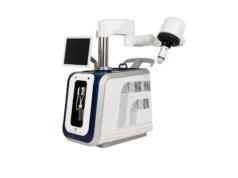
Novate Medical has announced that Souheil Saddekni, professor of Vascular and Interventional Radiology at the University of Alabama, Birmingham, USA, has enrolled the first patient in the SENTRY IDE study.
The SENTRY study is a prospective, single-arm, multicentre study designed to evaluate the safety and efficacy of Novate’s novel bioconvertible Sentry Inferior Vena Cava (IVC) Filter. Approximately 135 patients at transient risk of pulmonary embolism are being enrolled at up to 25 sites in the USA and internationally. The primary endpoint of the study is the composite rate of clinical success of the Sentry IVC filter at six months.
The Sentry IVC filter is the first bioconvertible IVC filter. It is designed to provide protection from pulmonary embolism during the period that a patient is at risk and then bioconvert to a non-filtering configuration after a minimum of sixty days. This feature removes the requirement for an additional interventional procedure to retrieve the device. In addition, Sentry has a cylindrical frame that is designed to reduce the reported complications of existing IVC filter technologies including tilt, migration, fracture and vessel perforation.
Saddekni comments, “The Sentry device performed well in the procedure and appears to offer a novel alternative in the prevention of pulmonary embolism. Interestingly, the patient considered the removal of the need for a second procedure to be an important factor during the process of consent. We are pleased to contribute this first case in this important study.”
SENTRY’s principal investigator, Michael Dake, Stanford University Medical Center, Stanford, California, USA, comments, “I am delighted that the SENTRY study is underway. The Sentry IVC filter is a truly novel device which potentially will change the way we manage patients at transient risk of pulmonary embolism. We hope to be able to show that the device design reduces the known complications of IVC filters while removing the need for a retrieval procedure.”












